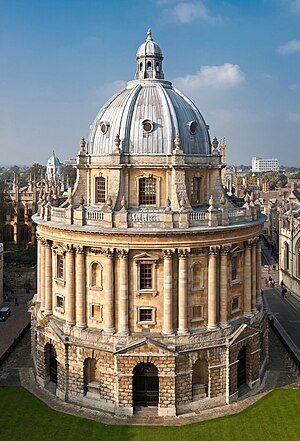| Main page | Indices | Projects |
The University of Oxford portal
The University of Oxford is a collegiate research university in Oxford, England. There is evidence of teaching as early as 1096, making it the oldest university in the English-speaking world and the world's second-oldest university in continuous operation. It grew rapidly from 1167, when Henry II banned English students from attending the University of Paris. After disputes between students and Oxford townsfolk, some Oxford academics fled northeast to Cambridge, where, in 1209, they established the University of Cambridge. The two English ancient universities share many common features and are jointly referred to as Oxbridge.
The University of Oxford is made up of 43 constituent colleges, consisting of 36 semi-autonomous colleges, four permanent private halls and three societies (colleges that are departments of the university, without their own royal charter), and a range of academic departments which are organised into four divisions. Each college is a self-governing institution within the university, controlling its own membership and having its own internal structure and activities. All students are members of a college. The university does not have a main campus, but its buildings and facilities are scattered throughout the city centre. Undergraduate teaching at Oxford consists of lectures, small-group tutorials at the colleges and halls, seminars, laboratory work and occasionally further tutorials provided by the central university faculties and departments. Postgraduate teaching is provided in a predominantly centralised fashion.
Oxford operates the Ashmolean Museum, the world's oldest university museum; Oxford University Press, the largest university press in the world; and the largest academic library system nationwide. In the fiscal year ending 31 July 2023, the university had a total consolidated income of £2.92 billion, of which £789 million was from research grants and contracts.
Oxford has educated a wide range of notable alumni, including 31 prime ministers of the United Kingdom and many heads of state and government around the world. As of October 2022,[update] 73 Nobel Prize laureates, 4 Fields Medalists, and 6 Turing Award winners have matriculated, worked, or held visiting fellowships at the University of Oxford, while its alumni have won 160 Olympic medals. Oxford is the home of numerous scholarships, including the Rhodes Scholarship, one of the oldest international graduate scholarship programmes. (Full article...)
Selected article
The first Honorary Fellows of Keble College, Oxford, were elected in 1931, when the college's governing body was given power to elect "distinguished persons" to this position. Under the current statutes of the college, Honorary Fellows cannot vote at meetings of the Governing Body and do not receive financial reward, but they receive "such other privileges as the Governing Body may determine." Those elected have included college alumni (for example, the Pakistan cricketer and politician Imran Khan, elected 1988), benefactors (for example Sir Anthony O'Reilly, elected 2002), and individuals of distinction without academic links to the college such as former U.S. President Ronald Reagan (pictured) (elected 1994) and the poet Sir John Betjeman (elected 1972). The three longest-serving Honorary Fellows are Sir John Forsdyke (Principal Librarian of the British Museum; appointed 1937, died 1979), Sir Thomas Armstrong (conductor; appointed 1955, died 1994) and Harry Carpenter (Warden of Keble, later Bishop of Oxford; appointed 1960, died 1993). (Full article...)
Selected biography
Selected college or hall
Christ Church (sometimes known as "The House" from its Latin name, Ædes Christi, or "House of Christ") is one of the largest Oxford colleges, and is also the site of the cathedral church of the Diocese of Oxford, namely Christ Church Cathedral, Oxford. The college can trace its history from 1525, when Cardinal Thomas Wolsey suppressed the Abbey of St Frideswide in Oxford and founded Cardinal College; he fell from favour before it was completed. King Henry VIII refounded it as King Henry VIII's College in 1532, and then (after the break from the Roman Catholic Church) as Christ Church in 1546, making it the cathedral of the new Oxford diocese as well. The buildings also include Tom Tower designed by Sir Christopher Wren, where "Great Tom" rings 101 times every night. Christ Church has produced thirteen British prime ministers, the two most recent being Anthony Eden (1955–57) and Sir Alec Douglas-Home (1963–64). The college is the setting for parts of Evelyn Waugh's Brideshead Revisited, as well as Lewis Carroll's Alice's Adventures in Wonderland – Carroll was a Fellow of the college and taught mathematics. Christ Church has been used in the filming of the movies of J. K. Rowling's Harry Potter series and the film adaptation of Philip Pullman's novel Northern Lights. (Full article...)
Selected image

Did you know
Articles from Wikipedia's "Did You Know" archives about the university and people associated with it:
- ... that Charles Ranken (pictured) and Lord Randolph Churchill founded the Oxford University Chess Club in April 1869, with Ranken becoming its first president?
- ... that John Verney became a Member of Parliament to gain contacts to help him in his career as a barrister?
- ... that W. G. Collingwood, John Ruskin's secretary and assistant, was a noted scholar of Norse history and art?
- ... that Rabbi Asher Lopatin supported a Chicago ban on foie gras on the grounds that the Torah prohibits cruelty to animals, noting that "chopped liver is good, but foie gras is bad"?
- ... that Alexander Wilkinson managed to play 74 more first-class cricket matches despite an injured hand that almost had to be amputated after World War I?
Selected quotation
Selected panorama
On this day
Events for 27 November relating to the university, its colleges, academics and alumni. College affiliations are marked in brackets.
|
Births
|
Deaths
|
Wikimedia
The following Wikimedia Foundation sister projects provide more on this subject:
-
Commons
Free media repository -
Wikibooks
Free textbooks and manuals -
Wikidata
Free knowledge base -
Wikinews
Free-content news -
Wikiquote
Collection of quotations -
Wikisource
Free-content library -
Wikiversity
Free learning tools -
Wikivoyage
Free travel guide -
Wiktionary
Dictionary and thesaurus














